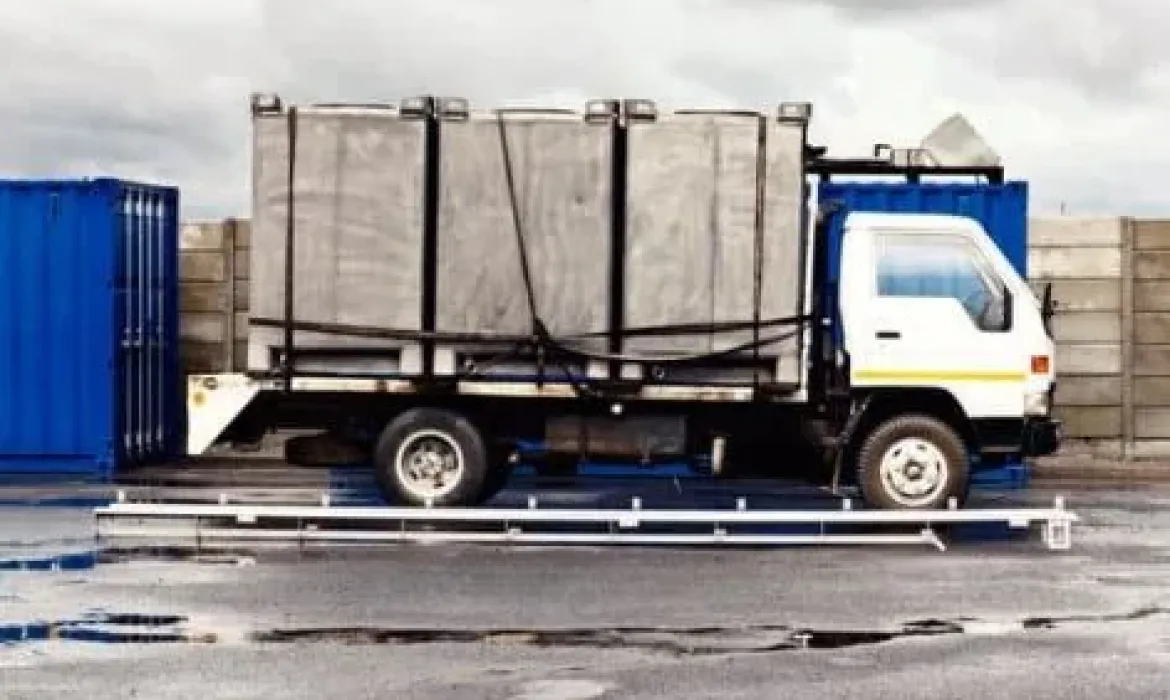Weighbridge Accuracy: Common Mistakes and How to Avoid Them
Ensuring weighbridge accuracy is critical for businesses across various industries. Whether you operate in logistics, agriculture, retail, or manufacturing, accurate weighing systems directly impact your bottom line. Incorrect measurements can result in financial losses, legal complications, and damaged business reputations. Weighbridge inaccuracies may lead to overloading penalties, disputes with suppliers or customers, and inefficiencies in inventory management.
This blog post aims to guide you through common mistakes businesses make with weighbridges and provide expert solutions to ensure your weighing operations run flawlessly. By implementing best practices, you can optimize your weighing processes, maintain compliance with legal standards, and enhance operational efficiency.
Why Weighbridge Accuracy Matters
Weighbridges serve as vital instruments for weighing heavy goods, vehicles, and bulk materials. Accuracy in weighing impacts multiple industries in the following ways:
For those in the logistics business, properly calibrated weighbridges ensure accurate load measurement, preventing overloading, which can lead to legal fines, damage to infrastructure, and excessive fuel consumption.
Farmers and agribusinesses rely on precise weight measurements to ensure fair trade, proper yield tracking, and accurate feed distribution.
Retail: In sectors like bulk goods and food retailing, inaccurate weighing can erode consumer trust, lead to financial discrepancies, and violate trading standards.
In the case of manufacturing, from raw material procurement to finished product distribution, precision in weighing ensures quality control, minimizes waste, and enhances cost-effectiveness.
Poor weighbridge accuracy not only affects financial performance but also undermines credibility with customers and regulatory bodies. Compliance with national and international trade laws requires precise weight measurements to avoid costly legal issues and maintain smooth business operations.
Common Challenges & Mistakes
- Poor Installation Practices
Incorrect site preparation and poor installation can lead to inaccurate readings. Uneven foundations and improper leveling can cause significant weighing errors.
Lack of a solid base may lead to shifting and misalignment over time. Improperly installed load cells can create false weight readings.
Not accounting for site drainage can lead to moisture buildup, affecting sensor performance.
- Overlooking Calibration
Routine calibration is often neglected despite its importance. Over time, environmental factors and frequent usage can cause drift in accuracy, leading to unreliable readings.
Irregular calibration schedules result in small errors accumulating over time. External factors, such as temperature fluctuations, can cause also weight discrepancies.
Many businesses assume initial factory calibration is sufficient for long-term accuracy, which is a costly mistake.
- Ignoring Environmental Factors
Environmental conditions can significantly impact weighbridge accuracy. Strong winds can create force imbalances, skewing weight readings.
Extreme temperatures may cause the expansion or contraction of metal components, affecting calibration. Vibrations from heavy machinery near the weighbridge can also introduce measurement inconsistencies.
- Overloading and Misuse
Exceeding the weighbridge’s capacity can damage load cells, leading to faulty readings and expensive repairs.
Vehicles not properly centered on the weighbridge can lead to uneven weight distribution and errors while also using the weighbridge for items beyond its designed purpose can degrade its components prematurely.
- Lack of Regular Maintenance
Routine maintenance is often overlooked, resulting in poor performance and reduced lifespan.
Dirt, debris, and rust accumulation can obstruct load cells, compromising weighing accuracy.
Loose cables and worn-out components contribute to fluctuating readings.
- Inadequate Staff Training
Operators unfamiliar with the correct procedures may unintentionally compromise weighbridge accuracy.
Poor understanding of proper loading techniques can lead to misreading.
Lack of training in troubleshooting minor weighbridge issues increases downtime.
- Using Outdated Equipment
Older weighbridges may lack the precision and technological enhancements of modern systems.
Analog weighbridges lack data integration features, making tracking and verification difficult.
Wear and tear over time can reduce sensor responsiveness, causing measurement inconsistencies.
Expert Solutions & Best Practices
- Proper Site Preparation and Installation
Ensure a stable, level foundation free from vibrations and shifting soil.
Work with professional installers like Singlestone Nigeria Limited to ensure high-quality installation.
Consider weatherproofing measures to protect weighbridges from extreme conditions.
- Regular Calibration
Implement a structured calibration schedule (monthly or quarterly, depending on usage).
Use certified technicians to adjust and verify accuracy against industry standards.
Conduct in-house checks using known weights to identify potential drift early.
- Environmental Safeguards
Install wind barriers or protective covers if operating in exposed areas.
Use insulation or heating mechanisms in regions with extreme temperature changes.
Minimize external vibrations by placing the weighbridge away from heavy machinery.
- Load Management Education
Train operators to properly position vehicles to avoid uneven weight distribution.
Implement strict policies to prevent overloading beyond the weighbridge’s capacity.
Use traffic control measures to ensure vehicles approach the weighbridge correctly.
- Routine Maintenance Checks
Conduct daily visual inspections for debris, dirt, and potential obstructions.
Schedule professional maintenance for thorough inspections and component replacements.
Lubricate moving parts and ensure electronic connections are intact.
- Staff Training Programs
Develop hands-on training sessions for weighbridge operators.
Provide manuals and digital guides on troubleshooting and best practices.
Encourage continuous learning through periodic refresher courses.
- Upgrading to Modern Weighbridges
Invest in digital weighbridges with real-time data capture and automated calibration features.
Choose weighbridges with integrated software for data logging and analysis.
Work with trusted providers like Singlestone Nigeria Limited for long-term accuracy and reliability.
Accurate weighbridges are crucial for operational efficiency, legal compliance, and financial stability. Poor accuracy can lead to financial losses, regulatory penalties, and damage to business’s reputation. By addressing common mistakes and implementing expert solutions, businesses can prevent costly errors and enhance productivity.
Singlestone Nigeria Limited offers state-of-the-art weighing solutions tailored to your industry’s specific needs. Whether you require new installations, regular calibration, or system upgrades, our expertise ensures precision in every measurement. Contact us today to learn more about our weighbridge solutions and how we can help your business achieve accurate and reliable weighing results.
How to Choose the Right Weighing Scale for Your Business: A Comprehensive Guide
Choosing the right weighing scale for your business is crucial for accuracy, efficiency, and regulatory compliance. Whether you operate in retail, manufacturing, logistics, or agriculture, the right scale can streamline operations, reduce losses, and improve overall productivity.
Imagine a logistics company that frequently faces penalties due to truck overloading or a retail store losing revenue due to inaccurate weighing. These real-world scenarios highlight how critical choosing the correct scale for business success is. This guide will help you identify the best weighing solution for your business needs.
WHY CHOOSING THE RIGHT WEIGHING SCALE MATTERS
Using the wrong scale can result in Financial losses due to inaccurate measurements, Compliance issues leading to regulatory fines, and operational inefficiencies slowing down business processes to mention a few.
Accurate weighing solutions help businesses maintain consistency, avoid waste, and comply with industry standards, leading to improved profitability and customer trust.
UNDERSTANDING YOUR BUSINESS WEIGHING NEEDS
Before purchasing a weighing scale, consider the following factors:
Industry Type: Different industries require different scales. For instance, retail businesses need precision scales for small goods, while logistics companies need heavy-duty weighbridges.
Weighing Capacity: Ensure the scale can handle the maximum weight your business deals with daily.
Accuracy Requirements: Some industries require ultra-precise measurements, while others can work with minor deviations.
Regulatory Compliance: Businesses must adhere to industry-specific regulations to avoid penalties and ensure smooth operations.
COMMON CHALLENGES AND MISTAKES BUSINESSES MAKE
Many businesses struggle with choosing and maintaining the right scale due to some common mistakes including but not limited to;
Choosing Based on Price Alone – Cheaper scales may compromise accuracy and durability.
Neglecting Calibration – Scales that are not regularly calibrated lead to inaccurate readings over time.
Ignoring Scale Capacity – Overloading a scale beyond its limit can cause permanent damage.
Not Considering Environmental Conditions – A scale used outdoors needs different features than one used in a controlled environment.
Failure to Integrate with Business Systems – Modern digital scales can integrate with ERP or POS systems to streamline operations.
TYPES OF WEIGHING SCALES AND THEIR APPLICATIONS
- Industrial Weighing Scales
Platform Scales: Ideal for warehouses and manufacturing facilities.
Bench Scales: Suitable for medium-weight items in industrial settings.
Crane Scales: Designed for weighing suspended loads in factories and construction sites.
- Retail Weighing Scales
Price Computing Scales: Common in grocery stores for weighing and pricing items.
POS Integrated Scales: Used in supermarkets to streamline sales and inventory tracking.
- Agricultural Weighing Scales
Livestock Scales: Essential for farmers measuring animal weights.
Grain Weighing Scales: Used for precise weight measurement of grains and other produce.
- Logistics and Transportation Weighing Scales
Weighbridges: Designed for measuring truckloads and ensuring regulatory compliance.
Onboard Weighing Systems: Provide real-time weight data for transport vehicles.
KEY FEATURES TO LOOK FOR IN A WEIGHING SCALE
Durability: Look for materials that withstand environmental conditions and heavy usage.
Digital vs. Analog: Digital scales offer better accuracy, connectivity, and ease of use.
Automation and Connectivity: Advanced scales with data integration enhance operational efficiency.
Calibration Options: Regular calibration ensures consistent and accurate readings.
INDUSTRY TRENDS AND FUTURE OUTLOOK
Weighing technology continues to evolve, bringing new opportunities for businesses to enhance efficiency and accuracy. Emerging trends include:
IoT-Enabled Weighing Systems – Smart scales that connect to the cloud for real-time monitoring.
AI-Powered Weighing Solutions – Machine learning algorithms improve weight accuracy and predictive maintenance.
Sustainable & Energy-Efficient Designs – Eco-friendly materials and low-power consumption options for weighing devices.
FAQs
Q: How often should a weighing scale be calibrated?
A: It depends on usage frequency, but most businesses should calibrate their scales at least once a month to maintain accuracy.
Q: What is the difference between a digital and analog scale?
A: Digital scales provide more precise readings, integrate with business systems, and have features like data storage, whereas analog scales are more traditional and less expensive but may lack accuracy.
Q: Can a weighing scale be used for multiple types of products?
A: Yes, but ensure the scale’s capacity, precision, and features match the products being weighed.
Investing in the right weighing scale ensures operational efficiency, compliance, and cost-effectiveness. Whether you need a weighbridge, precision scale, or an industrial platform scale, Singlestone Nigeria Limited offers reliable solutions tailored to your business needs. Contact us today for expert advice and high-quality weighing solutions!
Optimize your business with precision weighing. Let us guide you to the best weighing solutions!





